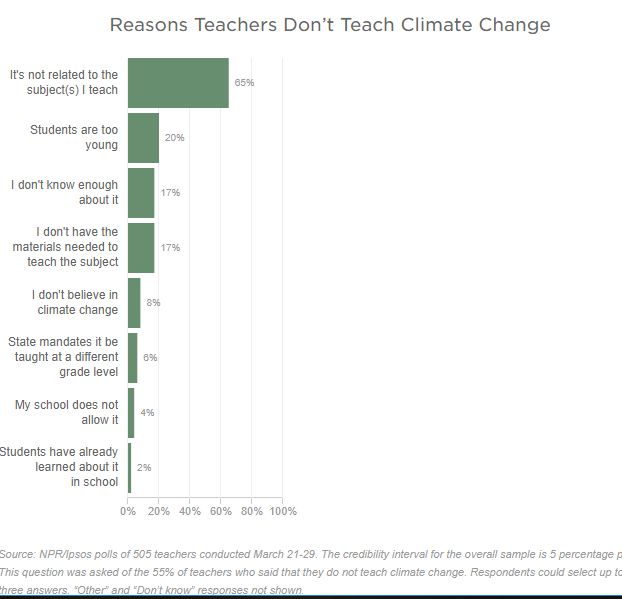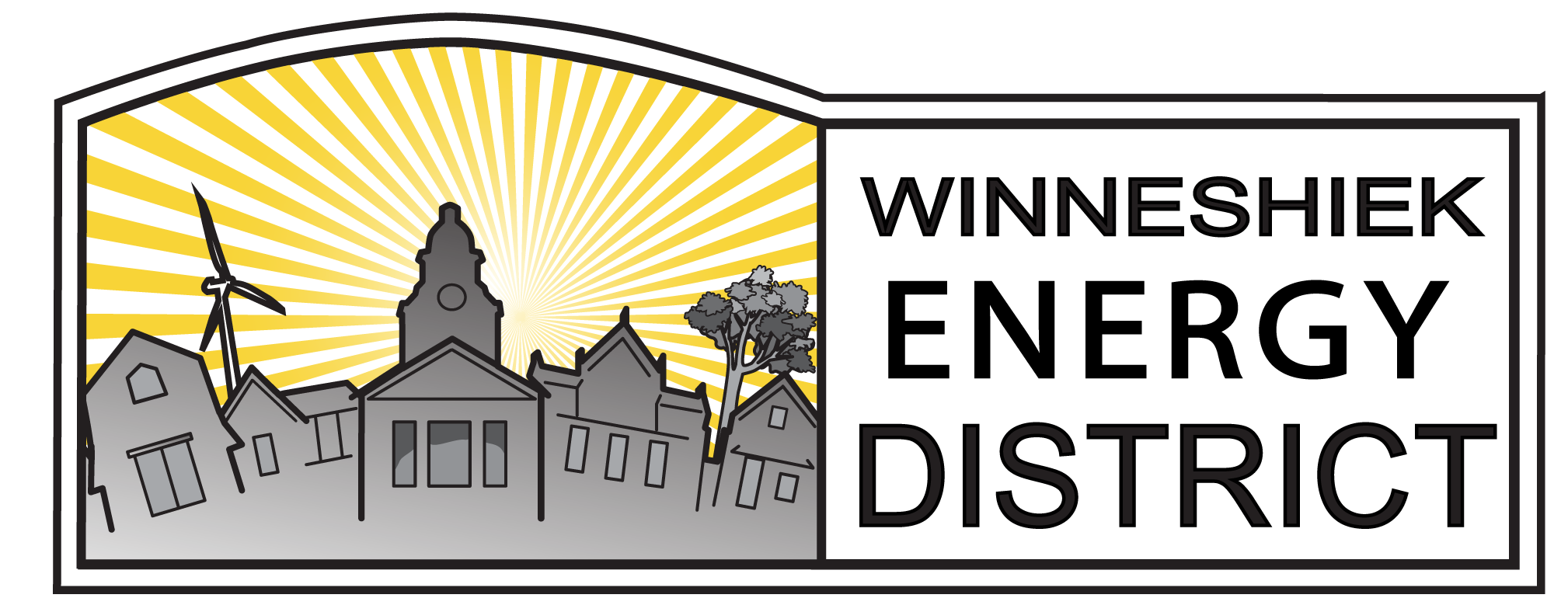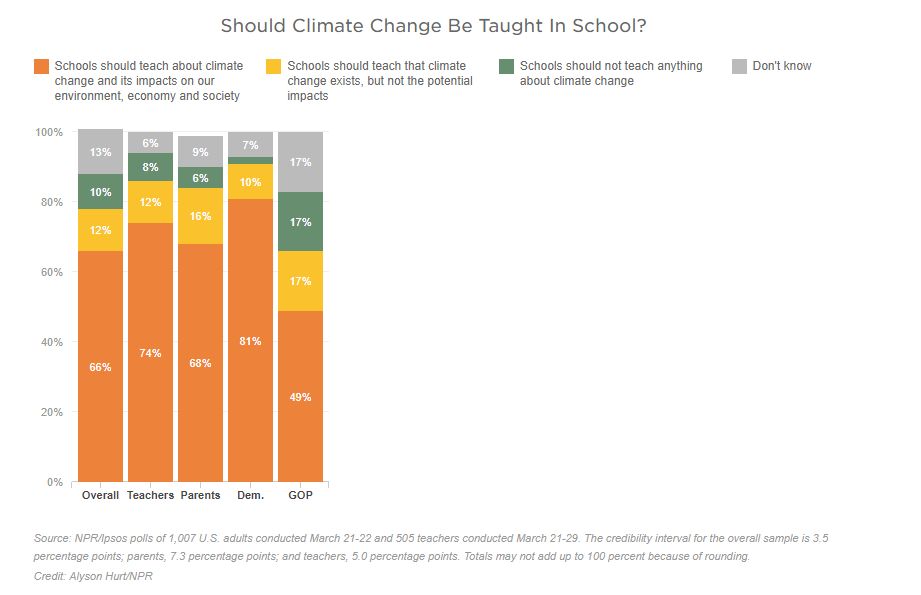The State of Climate Change Education in America
Luke Forsberg, Green Iowa AmeriCorps Summer Member
[View or download the PDF Climate Change Education in Schools Research-2019]
“All who have meditated on the art of governing mankind have been convinced that the fate of empires depends on the education of youth” -Aristotle
“Climate change should be taught from a young age so there’s no excuse for kids to grow up ignorant of what’s at stake” -Connecticut State Representative Christine Palm
“Climate change is no longer some far-off problem; it is happening here, it is happening now.” -Barack Obama
The second two quotes both point to the immediate crisis that is climate change. We have always heard that climate change will affect our children and our children’s children. But we know that it is affecting us here and now. Aristotle’s statement recognizes the importance of education has in a successful government. Education on climate change, one of the biggest issues in our world has for some reason struggled to hold a permanent place in our education system.
The science behind climate change has all but been proven (even though politicians and fossil fuel industry leaders would like us to think otherwise). The truth about the science and the politics of climate change is spread through the media and through daily conversation. What is needed is a uniform plan to educate today’s youth these truths through our school system. With the majority of the public agreeing that climate change is indeed happening and that we should be doing something about it, why isn’t there more agreement on teaching about it in school?
I don’t remember really learning about climate change much at all in elementary, middle, or high school. Granted, the overall discussion has very much increased in the last decade so things may have changed. I remember doing service projects like cleaning up litter around the school on Earth Day, and things like that, but I never recall directly talking about climate change in the classroom.
I have always been interested in education, I even thought about majoring in education and becoming a teacher late in high school and early college. Even though there have been many states that have adopted new standards for students to learn about climate change, that doesn’t necessarily mean it’s being taught. There are so many different challenges that teachers have to worry about when dealing with this unfortunately still a controversial topic. I had been wondering when is the right time to start talking about this subject in schools, at what age should we start introducing this problem to students? Where does it fit into the school curriculum? With climate change being one of if not the biggest issues of the next century, shouldn’t this be talked about more in every school and in more classes than just science class? There are a lot of different opinions about this out there and it has been a blast finding out what is going out there in the world of education on the instruction of climate change.
Here is what I found to be the most interesting points and questions that need to be answered in order to create the climate leaders of tomorrow.
People, in general, want to see climate change be taught in schools
While there is a fairly large partisan divide over much of the climate change issue, the desire to have it be part of the school curriculum is surprisingly close. According to an NPR/Ipsos poll of 1,007 adults and 505 teachers, 66% of Republicans and 91% of Democrats believe that climate change should be taught in schools. The same survey from NPR also said that 86% of teachers believe that climate change should be taught in schools. Steve Peterson, a 5th-grade teacher from the Decorah Community School District, when asked if he thought that schools are an appropriate place to talk about climate change, said, “Yes. Climate change is, and will be, a big part of our world. Schools should be talking about the big things”.
However, “more than half – 55% – of teachers surveyed said they do not cover climate change in their own classrooms or even talk to their students about it”. There are a lot of different reasons for this as depicted in the graph shown below. Some reasons are because teachers are not allowed to by law or school regulations, or they themselves are not well enough versed in climate change to be effective instructors on the topic. As climate change continues to play a bigger and bigger role in our lives people will inherently become more educated about it because it is directly affecting them.

Where does climate change belong in school curriculum?
Why is there such strong support for including climate change in classroom settings but there is so much less actual follow through?
While there is no one reason for this, like many things it is much easier said than done. The poll asked why teachers did not discuss climate change in their class and the results were quite interesting. The top reason given was that it was not related to the subject that they taught. With climate change being one of the top issues of our day, with many different facets across all parts of life, then it’s hard to say that it is not related to their subject. Obviously, there are other problems and case studies that are valuable to look at as well in cross-interest issues but climate change may be one of the top interdisciplinary topics ever. Joseph Henderson at Paul Smith’s College in New York claims, “For so long this has been seen as an issue that is solely within the domain of science. There needs to be a greater engagement across disciplines, particularly looking at the social dimensions.”[1]
There are so many different lenses to analyze climate change and its effects. Starting with the science of how it works and its causes, to the effect on the economy, the increasing tensions on people from climate migration, resource scarcity, etc. to the psychology of understanding why we have not dealt with the issue even though we have known about it for decades or longer.
When should we start talking about climate change in schools?
Assuming most people agree that climate change should be taught in schools, then when should we begin talking about it? Elementary School? Middle School? High School?
Elementary school is for developing young kids’ skills and the basic lessons on how to live life. Is there room in there for teaching specifically about climate change in these formative years? As I said, I really do not remember learning about climate change when I was young, and I thought my school did a great job preparing myself for the future. One of the Decorah teachers I talked to said, “My primary focus is on helping students get to know the world around them, to see the parts of it and how these fit together. I feel that this — learning to see and appreciate the complex relations in the systems around them — is a crucial step towards helping them understand what is threatened.” He then quoted an Aldo Leopold saying, “The impulse to conserve comes from knowing (and loving) the world you see around you”.
A lot of the science behind climate change may need to wait until students have a better grasp on biology, chemistry, and geology, but it is never too late to introduce kids to the concept that what we see around us hasn’t been like this forever and it will be very different by the time they grow up to be adults.
There are plenty of examples of classrooms beginning to talk about the environment and ways to live greener at a young age. Mercy Pena-Alevizos at Holy Trinity Academy in Phoenix Arizona says, “I teach preschoolers and use the environment and our natural resources to highlight our everyday life. I stress the importance of appreciation and eliminating waste. My students understand and have fantastic ideas. We recycle and pick up around our neighborhood”.[2] The best lessons for elementary-aged kids are usually the ones done outside of the physical classroom. Starting a school garden not only can be a way to produce food and flowers for the school, but it is also an excellent learning opportunity for environmental topics. Kids love to play in the dirt and look at plants, teachers can teach about compost as an alternative to landfills that produce harmful greenhouse gases.
Middle school and high school for most is a time for exploration into our developing interests and hobbies. While the environment obviously will not be one of those things for everyone, there will probably some aspect of climate change during this stage that at least slightly interests everyone. Middle and especially high school students will have gained enough basic scientific knowledge and experience with how the world and our modern society works to understand the true nature of climate change and why it is such a big deal. Just having more life experience as well as a greater variety of classes in high school makes this a great time to introduce the many different fields that come into contact with climate change.
Therefore, while it may a bit early to talk about the intricacies of climate change in elementary school, there are still a lot of concepts about nature and how the world works that will be required to understand the more complex issues later. Kids are naturally curious about the planet. Parents and teachers should always encourage this and if it feels appropriate they can start discussions about the state of the environment today.
How should we talk about climate change in schools?
With climate change being such a foundational issue that affects almost every part of life, it is hard to teach about anything in science, history, economics, or anthropology without talking about global warming be present as well. Often climate change can seem like such a big, abstract issue that it can be overwhelming and confusing to know where to start the conversation. While understanding all of the complicated climate data may be a bit over the heads of elementary-aged kids, there is always some way to introduce climate change to anyone. All parents and teachers really have to do is let kids explore the local community. This technique, called “glocalization” is “a strategy to tailor a global message to a local community”. People are more likely to engage when they feel a connection to the data, and positioning a global problem like climate change in a relatable context can be the entry point to engaging more broadly”.[3]
That is basically what the teacher I talked to from Decorah said about getting to know the world around his students. Learning about a few centimeters rise in sea level or that a city halfway across the world has seen its average temperature rise 1 °F over the last few decades wouldn’t really have much of an effect on a student. But, if a kid from northeast Iowa was told that the growing seasons for the corn in his local community has been noticeably changing or that farmers are needing to water more or use more fertilizer than in the past, that will make a much larger impact on the student’s awareness of climate change.
Conclusions
There is obviously a lot more to this discussion that could not be included in this post unless I felt like writing a book (I don’t know, maybe someday I will!). One of the most important takeaways from this is that climate change is a central issue of our time and what are we really accomplishing in schools if we are not teaching about something like that in the classroom. You couldn’t graduate high school without hearing about World War 2 countless times. Climate change is on that same level if not even worse with all of the tragedy it has and will cause. If we are trying to raise the leaders of the future, they must be prepared to deal with the effects of this crisis that few to nobody will be able to escape completely its reach.
There are still many challenges that have to be faced surrounding the issues of teaching climate change in schools. While some hold the view that schools are already cramming information in, so there is no possible way to fit something like this in, many feel that environmental issues provide one of the best well-rounded education opportunities where people with varied interests can find something that calls to them. We will need a lot of young people with new ideas to renovate our society to adapt to our quickly changing world. I’ll end with the same quote that I began with by Aristotle: “All who have meditated on the art of governing mankind have been convinced that the fate of empires depends on the education of youth”.
If you are interested in learning more about these issues or stories about the pursuit of getting climate change discussion into more schools around the country visit these great websites:
https://ncse.com/current-campaigns – National Center for Science Education – Action Alerts on science education legislation throughout the United States
https://naaee.org/ – North American Association for Environmental Education
Article: How Should Climate Change Be Taught in Schools Across America
References
Carter, Kate. “Climate Change Goes Glocal.” NCSE Blog (blog). July 7, 2019, Accessed August 15, 2019 https://ncse.com/blog/2019/07/climate-change-goes-glocal-0018925.
Kamenetz, Anya. “8 Ways to Teach Climate Change in Almost Any Classroom,” NPR. 2019. Accessed August 15, 2019. https://www.npr.org/2019/04/25/716359470/eight-ways-to-teach-climate-change-in-almost-any-classroom.
Kamenetz, Anya. “Most Teachers Don’t Teach Climate Change; 4 in 5 Parents Wish They Did.” NPR. 2019. Accessed August 15, 2019. https://www.npr.org/2019/04/22/714262267/most-teachers-dont-teach-climate-change-4-in-5-parents-wish-they-did.
Image Credits
https://www.npr.org/2019/04/22/714262267/most-teachers-dont-teach-climate-change-4-in-5-parents-wish-they-did
http://geiendorsed.com/blog/tips/school-gardens-help-kids-grow/
[1]Anya Kamenetz, “8 Ways to Teach Climate Change in Almost Any Classroom,” NPR, 2019, accessed August 15, 2019. https://www.npr.org/2019/04/25/716359470/eight-ways-to-teach-climate-change-in-almost-any-classroom
[2] Ibid.
[3] Kate Carter, “Climate Change Goes Glocal,” NCSE Blog (blog), July 7, 2019, accessed August 15, 2019 https://ncse.com/blog/2019/07/climate-change-goes-glocal-0018925


